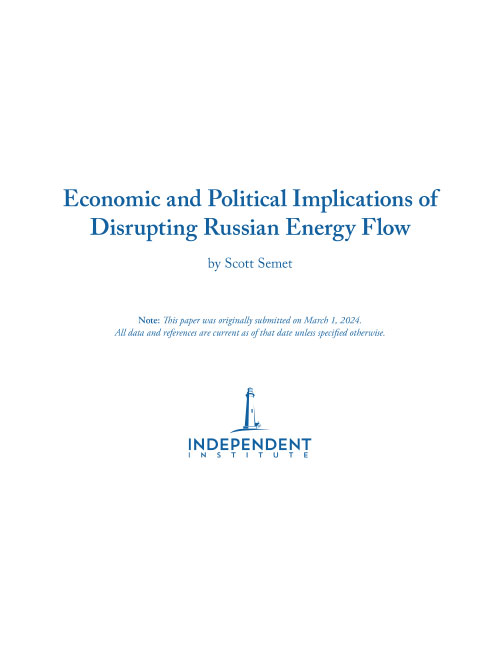Introduction
Moving energy from rich sources to productive uses, enabling the development of an advanced society with great benefits, is the story of our species. Our policies that disrupt these energy flows, ostensibly to punish Russian misdeeds, are causing severe longterm pain, particularly in Europe and the Global South. The costs to the United States and Russia are much less. We largely do not notice or do not care that imposing these costs on the rest of the world undercuts our position and undermines our claim to global leadership.
Furthermore, sanctions have not worked: Russia has not changed policies and its economy has begun to expand again. China, India, and the Global South continue to trade with Russia and have further distanced themselves from the United States due to its arm twisting. Going forward, doubling down on these failed policies and pressuring others to toe the line is likely to backfire as higher global energy prices degrade the economies of Europe and the Global South, fueling social unrest and animosity toward the United States.
In the United States, increasing LNG exports to capture higher prices abroad risks driving domestic gas prices up unless the current administration allows greater expansion of production and transport infrastructure. This would damage the US economy and could become a national security threat. Increasing exports at prices greater than those in the United States, together with our political stances, sows doubts and misgivings among allies about our motives and values.
These policies are also harmful to the environment. Few would argue against phasing out dirty coal, but US policies are actively encouraging the rest of the world to massively expand coal-fired capacity, damaging health globally. Pressure on these countries to not increase energy consumption is tantamount to suggesting that their people remain in poverty to achieve US policy goals, a most immoral, anti-human stance.
If these policies had been implemented on a temporary basis, the pain would have been less severe and easier to understand and tolerate. Making these measures permanent is terrible policy. Even if we bracket away the possibility of nuclear war, a never-ending state of hostility between the West and Russia does not bode well for achieving US foreign policy aims. Also, negative effects on the rest of the world and foreigners’ perception of our place in it are likely to worsen.
This paper analyzes the effect of current sanctions on the United States, Russia, Europe, the Global South, and the environment. It concludes that damage to relations between the United States and the rest of the world, the environment, and the economy argue for a change in US policy toward Russia, including a political solution to the conflict and restoration of energy flows. Such a solution would be more conducive to achieving our foreign policy goals, improve our standing in the world, and contribute to the well-being of people everywhere.








